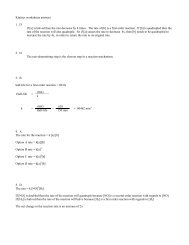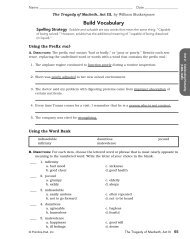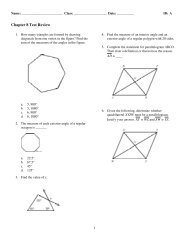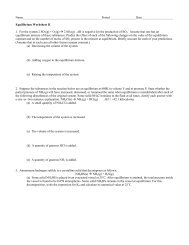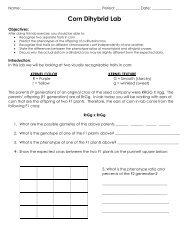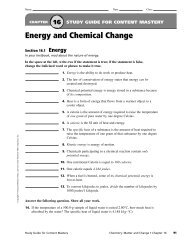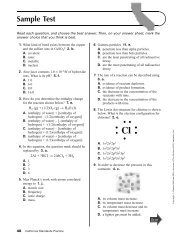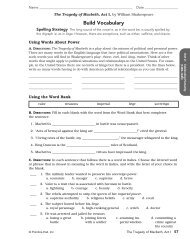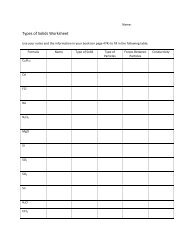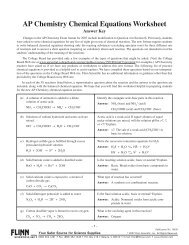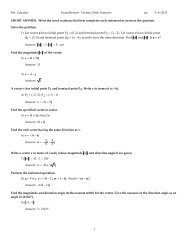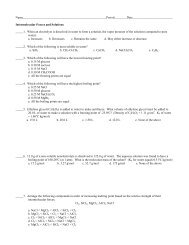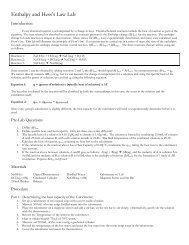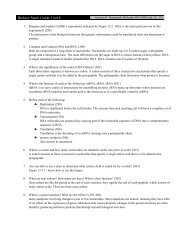Skills Development Workbook: Unit 5: Condition of Ireland
Skills Development Workbook: Unit 5: Condition of Ireland
Skills Development Workbook: Unit 5: Condition of Ireland
Create successful ePaper yourself
Turn your PDF publications into a flip-book with our unique Google optimized e-Paper software.
Name _____________________________________________________<br />
Date ___________________<br />
“<strong>Condition</strong> <strong>of</strong> <strong>Ireland</strong>,” The Illustrated London News<br />
“Progress in Personal Comfort” by Sydney Smith<br />
Build Vocabulary<br />
Spelling Strategy To form the plural <strong>of</strong> many nouns, add s or es. For example, the plural<br />
form <strong>of</strong> requisite is the word requisites.<br />
Using the Humors<br />
The Illustrated London News article describes problems faced by the Irish as melancholy,<br />
or sad. The word melancholy originally meant “black bile,” which is one <strong>of</strong> the four principal<br />
humors, or liquids, that people believed controlled health and personality. The other humors<br />
were yellow bile, blood, and phlegm. Modern English contains words originating from the theory<br />
<strong>of</strong> humors.<br />
A. DIRECTIONS: Answer the following questions, based on clues given about the humors.<br />
1. Phlegm is a thick, slow-moving fluid, so a phlegmatic person probably feels<br />
___________________________.<br />
2. A person controlled by the warm, life-giving flow <strong>of</strong> blood can be described as sanguine, or<br />
___________________________.<br />
Using the Word Bank<br />
requisites sanction exonerate<br />
melancholy indolence depredation<br />
B. DIRECTIONS: For each sentence, choose the Word Bank word that best completes its meaning.<br />
Write the word on the line.<br />
1. Some landowners were lazy, and everyone suffered from this ___________________________.<br />
2. The writer will ___________________________ people who meant no harm.<br />
3. More food, more cultivation, and more employment were the ___________________________<br />
for maintaining the Irish in existence.<br />
4. When walking at night without streetlights, the writer felt exposed to danger and<br />
___________________________.<br />
5. The law gave landowners the ___________________________ and encouragement to evict people.<br />
6. They could not get over the _________________________ sight <strong>of</strong> people needing to work for food.<br />
© Prentice-Hall, Inc. <strong>Condition</strong> <strong>of</strong> <strong>Ireland</strong>/Personal Comfort 195<br />
<strong>Unit</strong> 5: Progress and Decline<br />
(1833–1901)
Name _____________________________________________________<br />
Date ___________________<br />
“<strong>Condition</strong> <strong>of</strong> <strong>Ireland</strong>,” The Illustrated London News<br />
“Progress in Personal Comfort” by Sydney Smith<br />
Grammar and Style: Coordinating Conjunctions<br />
A coordinating conjunction links two sentence parts <strong>of</strong> the same grammatical kind. The<br />
seven coordinating conjunctions are and, but, or, nor, yet, so, and for. Notice the use <strong>of</strong> coordinating<br />
conjunctions in the following passages.<br />
from “<strong>Condition</strong> <strong>of</strong> <strong>Ireland</strong>”<br />
The present condition <strong>of</strong> the Irish…has been mainly brought on by ignorant and vicious<br />
legislation. . . .<br />
We shall fully consider that question before we quit the subject, but we shall now only say . . .<br />
from “Progress in Personal Comfort”<br />
. . . I now glide without noise or fracture, on wooden pavements.<br />
A. Practice: Read the following passages from “Progress in Personal Comfort” and “<strong>Condition</strong> <strong>of</strong><br />
<strong>Ireland</strong>.” Underline any coordinating conjunctions that you find.<br />
1. I can walk, by the assistance <strong>of</strong> the police, from one end <strong>of</strong> London to the other, without molestation;<br />
or, if tired, get into a cheap and active cab . . .<br />
2. Calmly and quietly, but very ignorantly . . . did the decree go forth which has made the temporary<br />
but terrible visitation <strong>of</strong> a potato rot the means <strong>of</strong> exterminating, through the slow process <strong>of</strong> disease<br />
and houseless starvation, nearly the half <strong>of</strong> the Irish.<br />
B. Writing Application: Rewrite each <strong>of</strong> the following pairs <strong>of</strong> sentences, connecting them with<br />
a coordinating conjunction.<br />
1. Most people believe progress is always good. “<strong>Condition</strong> <strong>of</strong> <strong>Ireland</strong>” reveals something different.<br />
2. In the name <strong>of</strong> economic progress, many people suffered. Many people died.<br />
3. The Poor-Laws were supposed to provide relief for the people in <strong>Ireland</strong>. The laws instead<br />
caused the people’s destruction.<br />
4. People lost their land. They lost their livelihoods.<br />
5. “<strong>Condition</strong> <strong>of</strong> <strong>Ireland</strong>” calls for compassion. It calls for change.<br />
196 Selection Support © Prentice-Hall, Inc.
Name _____________________________________________________<br />
Date ___________________<br />
“<strong>Condition</strong> <strong>of</strong> <strong>Ireland</strong>,” The Illustrated London News<br />
“Progress in Personal Comfort” by Sydney Smith<br />
Reading Strategy: Distinguishing Emotive and<br />
Informative Language<br />
Emotive language includes words, phrases, and examples that appeal to a reader’s feelings.<br />
Informative language conveys facts. Often emotive language is woven into the informative language<br />
<strong>of</strong> an essay to capture the interest and emotions <strong>of</strong> readers and to reveal the attitude <strong>of</strong> a<br />
writer toward his or her subject.<br />
DIRECTIONS: As you read the selections, identify examples <strong>of</strong> emotive and informative language.<br />
In each <strong>of</strong> the following passages from the selections, underline emotive language and circle informative<br />
language. Then analyze the emotive words in the passages to determine the writer’s<br />
attitude toward a particular subject or idea.<br />
“<strong>Condition</strong> <strong>of</strong> <strong>Ireland</strong>”<br />
1. The Poor-Law, said to be for the relief <strong>of</strong> the people and the means <strong>of</strong> their salvation, was the<br />
instrument <strong>of</strong> their destruction. In their terrible distress, from that temporary calamity with which<br />
they were visited, they were to have no relief unless they gave up their holdings.<br />
Attitude _________________________________________________________________________________<br />
2. Calmly and quietly, but very ignorantly—though we cheerfully exonerate the parties from any<br />
malevolence; they only committed a great mistake, a terrible blunder, which in legislation is worse<br />
than a crime—but calmly and quietly from Westminster itself . . . did the decree go forth . . .<br />
Attitude _________________________________________________________________________________<br />
“Progress in Personal Comfort”<br />
3. It took me nine hours to go from Taunton to Bath, before the invention <strong>of</strong> the railroads, and I now<br />
go in six hours from Taunton to London! In going from Taunton to Bath, I suffered between 10,000<br />
and 12,000 severe contusions, before stone-breaking Macadam was born.<br />
Attitude: ________________________________________________________________________________<br />
4. There were no banks to receive the savings <strong>of</strong> the poor. The Poor Laws were gradually sapping the<br />
vitals <strong>of</strong> the country; and whatever miseries I suffered, I had no post to whisk my complaints for a<br />
single penny to the remotest corners <strong>of</strong> the empire . . .<br />
Attitude: ________________________________________________________________________________<br />
© Prentice-Hall, Inc. <strong>Condition</strong> <strong>of</strong> <strong>Ireland</strong>/Personal Comfort 197<br />
<strong>Unit</strong> 5: Progress and Decline<br />
(1833–1901)
Name _____________________________________________________<br />
Date ___________________<br />
“<strong>Condition</strong> <strong>of</strong> <strong>Ireland</strong>,” The Illustrated London News<br />
“Progress in Personal Comfort” by Sydney Smith<br />
Literary Analysis: Journalistic Essay<br />
Journalistic essays are short prose pieces that describe current events or trends. Unlike<br />
personal essays, which focus on a writer’s inner reflections and personal reactions to experiences,<br />
journalistic essays examine news, facts, and events and try to make them directly relevant<br />
to a wider audience. The writer <strong>of</strong> a journalistic essay gathers facts and weaves them into<br />
a unified story.<br />
DIRECTIONS: Answer the following questions.<br />
1. What purely factual information does the journalistic essay “<strong>Condition</strong> <strong>of</strong> <strong>Ireland</strong>” present<br />
about the Famine and Britain’s Poor-Laws?<br />
2. What voice is used in The Illustrated London News article? What perspective does this voice<br />
provide on the facts surrounding the famine? Name specific examples from the selection<br />
that demonstrate the writer’s perspective.<br />
3. According to “Progress in Personal Comfort,” what inventions and services came about<br />
during Sydney Smith’s life?<br />
4. How might you describe the voice <strong>of</strong> Sydney Smith in “Progress in Personal Comfort”? What<br />
unique story about progress and a changing world does he tell? Give specific examples <strong>of</strong><br />
Smith’s perspective on these events.<br />
198 Selection Support © Prentice-Hall, Inc.



